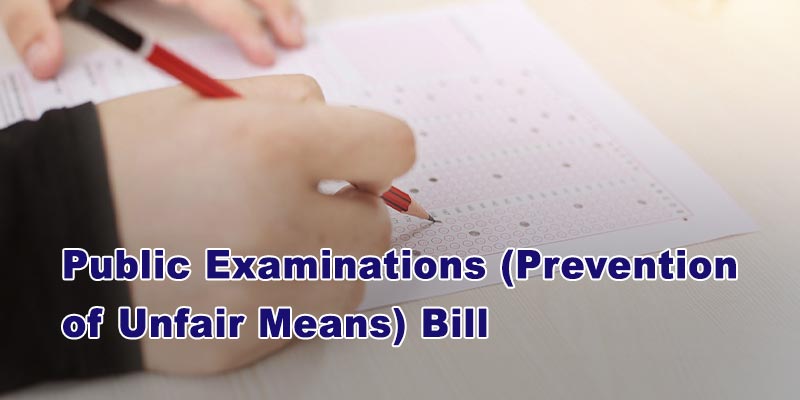- India
- Feb 06
Govt introduces new Bill to curb malpractices in govt recruitment exams
The government has introduced the Public Examinations (Prevention of Unfair Means) Bill in the Lok Sabha to check malpractices in government recruitment exams such as paper leaks and fake websites, with strict penalties.
What is the purpose of this Bill?
• Malpractices in public examinations lead to delays and cancellation of examinations adversely impacting the prospects of millions of young people.
• At present, there is no specific substantive law to deal with unfair means adopted or offences committed by various entities involved in the conduct of public examinations by the central government and its agencies.
• Therefore, it is imperative that elements that exploit vulnerabilities of examination system are identified and effectively dealt with by a comprehensive central legislation.
• The objective of the Bill is to bring greater transparency, fairness and credibility to the public examination systems and to reassure the youth that their sincere and genuine efforts will be fairly rewarded and their future is safe.
• The Bill is aimed at effectively and legally deterring persons, organised groups or institutions that indulge in various unfair means and adversely impact the public examination systems for monetary or wrongful gains.
Unfair means mentioned in the Bill
The unfair means relating to the conduct of a public examination shall include any act or omission done or caused to be done by any person or group of persons or institutions, and include but not be restricted to, any of the following acts for monetary or wrongful gain:
i) Leakage of question paper or answer key or part thereof.
ii) Participating in collusion with others to effect leakage of question paper or answer key.
iii) Accessing or taking possession of question paper or an Optical Mark Recognition response sheet without authority.
iv) Providing solution to one or more questions by any unauthorised person during a public examination.
v) Directly or indirectly assisting the candidate in any manner unauthorisedly in the public examination.
vi) Tampering with answer sheets including Optical Mark Recognition response sheets.
vii) Altering the assessment except to correct a bona fide error without any authority.
viii) Willful violation of norms or standards set up by the central government for conduct of a public examination on its own or through its agency.
ix) Tampering with any document necessary for short-listing of candidates or finalising the merit or rank of a candidate in a public examination.
x) Deliberate violation of security measures to facilitate unfair means in conduct of a public examination.
xi) Tampering with the computer network or a computer resource or a computer system.
xii) Manipulation in seating arrangements, allocation of dates and shifts for the candidates to facilitate adopting unfair means in examinations.
xiii) Threatening the life, liberty or wrongfully restraining persons associated with the public examination authority or the service provider or any authorised agency of the government, or obstructing the conduct of a public examination.
xiv) Creation of fake websites to cheat or for monetary gain.
xv) Conduct of fake examination, issuance of fake admit cards or offer letters to cheat or for monetary gain.
Other key points:
• The Bill will cover entrance examinations held by the Union Public Service Commission (UPSC), the Staff Selection Commission (SSC), the Railways, banking recruitment examinations and all computer-based examinations conducted by the National Testing Agency (NTA).
• Ministries or departments of the central government and their attached and subordinate offices for recruitment of staff and any authority as may be notified by the central government for conduct of government job recruitment are also under the ambit of the proposed legislation.
• It proposes a minimum of three to five years of imprisonment to curb cheating and those involved in organised crimes of cheating will face five to 10 years of imprisonment and a minimum fine of Rs 1 crore.
• The Bill is aimed at preventing organised gangs and institutions that are involved in unfair means for monetary gains, but it protects candidates from its provisions.
• Candidate as defined in the Bill shall not be liable for action within the purview of the Bill and shall continue to be covered under the extant administrative provisions of the concerned public examination authority.
• The Bill shall serve as a model draft for states to adopt at their discretion. This would aid states in preventing the criminal elements from disrupting conduct of their State level public examinations.
Manorama Yearbook app is now available on Google Play Store and iOS App Store

